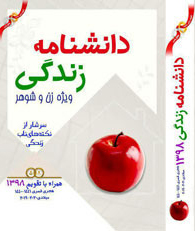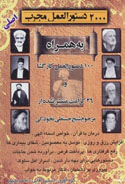کلیپ های دیدنی
مشاوره و خانواده
با توجه به ترک خود ارضایی عوارض آن هنوز در من هست چگونه آن را برطرف کنم ؟
13-08-1399 بازدید:5656 مباحث جنسی و زناشویی همکار پاسخگو

آیا بخاطر وسواس فکری توهین به مقدسات گناه دارد؟
19-05-1398 بازدید:5358 مشکلات و اختلالات روانی همکار پاسخگو
آیا از طریق اینترنت می تواند ازدواج موقت کرد ؟
پرسش: با سلام من 22 سالمه از پارسال با يه دختري در…
از زندگی سیر شدم و آرامش ندارم چکار کنم؟
پرسش : سلام..خواهش ميکنم يه راهي جلو روم بذارين من از…
من از تاریکی شب به دلیل توهمات ذهنیم میترسم چکار کنم؟
پرسش: من وقتي در خانه تنها مي شوم و هوا تاريك…
شب ها كابوس فيلم هاي مبتذل را که قبلا نگاه می کردم میبینم!
پرسش: (در خصوص توبه از ديدن فيلم هاي مبتذل) در اين…
بنده متاهلم و در اینترنت با دختری آشنا شدم که کارمون به گناه کشید!
پرسش: بنده یک مشکلی دارم که می خواستم از شما راهنمایی بخواهم…
جوانی هستم که از زندگی خسته شده و احساس پوچی می کنم!
پرسش: راستش نمی دانم از کجا شروع کنم. 20 ساله هستم…
از طریق اینترنت با پسری آشنا شدم و مدتها با هم در ارتباط بودیم!
پرسش:من دانشجوی ارشد رشته حقوق تقریبا حدود 1 سال پیش…
چرا خانواده ها عاشق شدن را برای جوانان (دختر) بد می دانند؟
پرسش: چرا خانواده ها عاشق شدن را برای جوانان (دختر) بد…
چگونه دیدن فیلم های مبتذل را ترک کنم؟
پرسش: با سلام به حضور حضرت عالي اگرخاطرتان باشد ،من قبلا هم…
با شوهرم قبل از ازدواج رابطه نانشروع داشتم!
پرسش: با سلام من زنی 25 ساله هستم.حدود 1 سال است…
اگر دختری عاشق غیر هم جنس خود...؟
پرسش: اگر دختری عاشق غیر هم جنس خود شود البته نه…
اگر نتوانيم جلو شهوت خود را بگيريم ، چه بايد بكنيم ؟
پرسش: اگر نتوانيم جلو شهوت خود را بگيريم ، چه بايد…
جوانی هستم 21 ساله اهل تهران و تمایل زیادی به سکس دارم
پرسش: من جوانی هستم21 ساله اهل تهران وتمایل زیادی به سکس…
نمي دونم چرا از ازدواج مي ترسم؟!
پرسش: سلام مشکل من اینه که نمي دونم چرا از ازدواج مي…
چرا به زن مطلقه با یک چشم و دید دیگری نگاه می کنند؟!!
پرسش: سلام حاج آقا من یک خانم مطلقه هستم و سوالم اینه…
چرا مخالف رابطه دختر و پسر هستید؟؟!!
پرسش: سلام حاجاقا چند تا سوال داشتم ممنون میشم جواب بدید. 1 چرا…
شب زفاف یا حجله چه شبی است و زن و مرد چکار باید بکنند؟
پرسش: شب زفاف و یا شب حجله که در روایات هم…
چه زمانی برای رابطه جنسی با همسر مناسب است؟
پرسش: چه زمانی برای رابطه جنسی با همسر مناسب است؟ و…
دختری که در سن جوانی و نوجوانی دچار شهوت می شود چه باید بکند؟
پرسش:دختری که درسن جوانی و نوجوانی دچار شهوت می شود…
می خواهم خوب باشم ولی دوست دخترم نمی گذارد!!
پرسش: به دلیل که من مدتی است به شهر آمده ام…
وقتی که عصبانی می شوم دیگر هیچ چیزی دست خودم نیست چکار کنم؟
پرسش: سلام آقای پاسخگو من دارای اخلاق بدی هستم وبا همه خواهر…
من دحتر قبلی نيستم و به يك دختر فاسد تبديل شده ام!
پرسش: من دختري هستم 14ساله من اول دختري سنگين بودم اما…
در مورد وسواسی و راه درمان آن توضیح بفرمایید؟
پرسش: وسواسی چیست و برای درمان آن چه راهکارهایی معرفی می…
خواسگارم بد اخلاق است آیا جواب مثبت بدهم؟
سوال: آیا به پسر بد اخلاق که خواستگاری کرده جواب مثبت…
اخلاقم رُك گفتن است اما حق ميگويم و شوهرم مخالف رفتارم است.
پرسش: اخلاقم رُك گفتن است اما حق ميگويم و شوهرم…
خواستگارم دو ازدواج و یک نامزدی ناموفق داشته جواب مثبت بدم؟
پرسش: خانمی هستم که در گذشته، یک ازدواج_ناموفق داشتم. در حال…
شوهرم گلایه میکنه که چرا همیشه به حرفم گوش میدی!
پرسش: من 20 سالمه 1 ساله ازدواج کردم شوهرم 22 سالشه…
دختر 36 ساله ای که چهره زیبایی ندارد چکار کند؟
پرسش: با سلامدختر 36 ساله اي که مومن و حافظ قرآن…
اختلاف سني پسر با دختر تا چه مقدار ايده آل است؟
پرسش: ميخواستم بدونم ايا ازدواج با دختري که سنش با پسر…
چگونه از انحرافات جنسى به دور باشيم؟
پرسش: در فاصله سنّ بلوغ تا هنگام ازدواج چگونه از انحرافات…
بعضی وقتا اعصابم میریزه بهم با نامزدم بدرفتار میکنم چطورخودمو کنترل کنم؟
پرسش: سلام ببخشید ی سوالی داششتم من دختری۱۸سالم ۷ماهه عقدکردم بعضی…
نقش خانواده در تربيت فرزندان چیست؟
پرسش: نقش خانواده در تربيت فرزندان چیست؟ پاسخ: با سلام و ادب خدمت شما…
نامزدم مي خواهد در كوچه و خيابان آرايش كرده و كمي از موهايم را از روسري بيرون بگذارم!
پرسش: من تا قبل از نامزديم بسيار با حجاب بودم. البته…
چرا برخی مردان در کنار همسرشان آرامش نمی یابند؟
پرسش: قرآن مجيد وجود زن را كانون محبّت و…
علت و شرايط تحقق صيغه چيست؟
پرسش: علت و شرايط تحقق صيغه چيست؟ پاسخ:…
چرا بین دو هوو همیشه اختلاف وجود دارد؟
پرسش: چرا بين دو همسر(زن) با وجود مشروعيّت ازدواج…
پرسش و پاسخ
آیا کسی که شراب بنوشد تا چهل روز نماز و عباداتش قابل قبول نیست ؟
13-08-1399 بازدید:2877 مسائل متفرقه نماز همکار پاسخگو

اذان در جامعه اسلامی نماد چیست ؟ و چرا فقط سه بار در روز تکرار می شود ؟
پرسش: اذان در جامعة اسلامی نماد چیست و…
حکم مشروبات الکلی از دیدگاه اسلام چیست ؟
پرسش: حکم مشروبات الکلی از دیدگاه اسلام چیست…
چرا با این همه ظلم و ستم در جهان امام زمان (عج) ظهور نمی کند ؟
پرسش: چرا با این همه ظلم و ستم…
اگر نگاه به نامحرم گناه است چرا در فیلمهای خارجی زنهای بدون حجاب را نشان میدهند؟
پرسش: چرا میگویند نگاه کردن به نامحرم گناه…

با چه شیوه هایی میتوانیم پیرو انبیاءالهی باشیم ؟
پرسش : چه راه و روشی را پیبگیریم…
چرا زرتشتیان به اعتقاداتشان پایبند هستند ولی مسلمانان نه؟
پرسش : چرا در دین زرتشت گفتار نیک،…
چرا معانی دقیق آیات قرآن مشخص نیست و نیاز به تفسیر دارد ؟
پرسش : به چه دلیل تا تفسیرهای متعدد…
آیا جهت انجام هر کار نامشروعی می توان صیغه جاری کرد ؟
پرسش : اهمیت صیغه کردن در چیست؟ با…
اگر پیامبر (ص) عرب زبان نبود آیا قرآن باز هم به زبان عربی نازل می شد؟
پرسش : اگر حضرت محمد(ص) زبان دیگری به…
آیا در بین پیامبران ،پیامبر خشن هم وجود دارد؟
پرسش : پیامبران به مهربانی معروف میباشند آیا…
با توجه به محاسن روزه آیا معایبی هم در آن هست ؟
پرسش : روزه محاسن بسیاری دارد، آیا این…
جنس خداوند از چه چیزی می باشد و خدا چیست؟
پرسش : جنس خداوند از چه چیزی میباشد…
معنی خدا چیست؟چرا خداوند از حروف دیگر استفاده نکرده است؟
پرسش : تعریف لغوی خدا چیست و چرا…
خال کوبی ابرو (تاتو )از نظر شرعی برای وضو و غسل چه حگمی دارد ؟
پرسش : خالکوبی ابرو (تاتو) از نظر شرعی…
شنیدن صدای زنان در مراسم عزاداری و مولودی چه حکمی دارد ؟
پرسش : شنیدن صدای زنان در مراسم عزاداری…
در چه صورتی امر به معروف و نهی از منکر واجب می شود؟
پرسش : در چه صورتی امر به معروف…
چرا در ایران مردی که از دین خود برگردد حکم اعدام را دارد ؟
پرسش: چرا در ایران مردی که از دین…
آیا ازدواج زن شیعه با مرد سنی اشکال دارد؟
پرسش : آیا ازدواج زن شیعه با مرد…
لمس آیات قرآنی که بر سنگ قبر نوشته شده است بدون وضو چه حکمی دارد ؟
برسش : لمس آیات قرآنی که بر سنگ…
فرق بین احتیاط واجب و احتیاط مستحب چیست؟
پرسش : فرق بین احتیاط واجب و احتیاط…

آیا با زیارت امامان و بوسیدن ضریح آنان انسان دچار شرک می شود؟
پرسش : آیا اعتقاد به این که شیعیان…

چرا در نماز از مهر استفاده میکنیم و فقط پیشانی بر خاک قرار می دهیم؟
پرسش : با توجه به این که هنگام…
آیا علائم هنگام ظهور امام زمان (عج) واقعیت دارد؟
پرسش : آیا وجود نشانههایی هنگام ظهور حضرت…
با وجود مساوات بین زن و مرد چرا مردان در اولویت قرار دارند؟
پرسش : با توجه به این که ما…
طریقه خواندن نماز در زمان رسول خدا (ص) چگونه بوده است؟
پرسش : طریقه نماز خواندن از زمان رسول…
چگونه می توانیم از گناه غیبت پرهیز کنیم؟
پرسش : چگونه میتوانیم از گناه غیبت پرهیز…
چگونه از بدخلقی و صفات زشتم دوری کنم؟
پرسش : چه راهی وجود دارد که انسان…
قطع رابطه با اعضای خانواده که از نظر شخصیتی و اجتماعی مشکل دارند گناه است؟
پرسش : آیا قطع رابطه با افراد خانواده…
آیا روح انسان بعد از مرگ در جسم دیگری دمیده می شود و دوباره به زندگی میکند؟
پرسش : آیا این نظریه درست است که…
اینکه در نماز کاهلی میکنم آیا در دینم خللی ایجاد می شود؟
پرسش : خدا را خیلی دوست دارم،همیشه در…
دلیل علاقه خاص به بعضی از امامان چیست؟
پرسش : چرا برخی برای بعضی امامان ارادات…
در شب اول قبر چه سوالاتی از ما پرسیده می شود ؟
پرسش : شب اوّل قبر چه سئوالاتی از…
آیا دوست داشتن یک نا محرم و ارتباط با او گناه است؟
پرسش : اگر کسی را واقعاً از صمیم قلب…
آیا ادعای ملاقات امام زمان (عج) از جانب برخی افراد صحت دارد ؟
پرسش : بر اساس روایتهای فراوانی امام زمان(عج)…
چرا به اصول و قواعد دین اسلام توجه نمی شود و پذیرش آن از سوی پیروان ادیان دیگر سخت است…
پرسش : دین اسلام کاملترین دینهاست و آسانترین…
آیا نظریه تناسخ از دیدگاه اسلام پذیرفته شده است ؟
پرسش : آیا نظریه تناسخ که بزرگان زیادی…
دست نوشته های طلبه پاسخگو

برای احترام به این ماه هم که شده این کار را انجام بده. مطمئن باش که یاد خدا باعث می شود که هیچوقت به سمت آن اشتباهات نروی.
برای همین یک ماه هم که شده از آن ها صرف نظر کرد و در ضیافت خدا شرکت بنما. بعد از این یک ماه، کیفیت زندگی ات را با گذشته مقایسه کن.
اگر بدتر شده بودی، دوباره به سمت آن گناهان و اشتباهات برو. ولی این ماه چنان عشقی به تو می دهد که دیگر زندگی ات به مانند گذشته نخواهد شد. این ماه خداوند تو را با عشق پذیرایی می کند.
Fundamental principles of Islam
Fundamental principles of Islam
Islam as a Divine religion is a complete system which establishes and founds thought for men in the 1st step then commands him to behave based on the system to achieve prosperity in this world life and the next one in the 2nd step. Therefore Islam in order to guide man commands him to believe in five important Fundamental principles then perform some ritual and religious commands. Among these ritual practices, ten of them are really important so Muslims should perform then in accordance with their ability under some conditions. The article aims to present a brief introduction of these five principles and ten ritual acts.
The five fundamental principles of religion are:
1- Tawhid (Oneness of God) - The most fundamental aspect of all beliefs revolves around the total acceptance of the Absolute and Perfect Creator. Belief in the Originator of all causes and effects with no effect on Him and that He is One, Ever living, Beneficent and Merciful. He has neither a colleague nor a partner. He does not bear, nor is He born, and there is none like Him.
The Almighty Allah is Unique and is Absolute in the Absolute sense. No entity in His Universe can ever comprehend His true state and none should even bother to try for it will lead to futility and insanity. Yet there is no doubt in any sane mind that His existence precedes all and His presence is absolutely ubiquitous (ever-present).
For anyone to say that God does not exist is a liar and a fool because such a person can NEVER disprove His existence, whether scientifically or philosophically, or for that matter in any method known. Because He is Absolute and none is like Him, no one in the relative world can ever physically define Him, and thus all idol worshippers and those who ascribe a shape or a body to Him are wrong. Ascribing a shape to the One who is beyond our limited perceptions would be tantamount to lying and giving a false appearance and a false representation. In addition, to believe that one can see God in the physical sense of sitting on a throne like some mythical being is certainly an untrue statement and should never be accepted. The Almighty Creator brings to existence everything with utmost Perfection and nothing in His Universe is imperfect. Thus to state that the Creator has created imperfect things is certainly a false statement. He is the One and only and is absolutely independent of anything and everything that exists. Glorified be His names, the Most High!
2- Adl - (Justice) - Essentially part of Tawhid. Belief that God is Just. He will reward or punish any person according to his deeds and behavior. It is absolutely forbidden in Islam to believe that the Almighty, Merciful Allah planned our destiny and that the good and the bad are just His Will and there is no choice for us between them (God forbid!). Those who ascribe to such lies do so because they want to blame their own evils on Allah and claim the good for themselves!
Although the attribute of Allah's Justice is not a separate entity of Allah for certainly the Almighty God can never be compartmentalized nor defined in any relative terms, it is nonetheless absolutely compulsory to believe and fully understand the importance of this attribute in Islam.
3- Nubuwwat - (Prophethood) - Belief in the Prophets (PBUTH) of Allah who excel all other persons for whom they are sent for. All prophets of Allah are perfect and sinless (infallible). Prophet Muhammad Mustafa (PBUH&HF) is the last of the prophets sent by God and the sealer of prophets for NO more are to come, EVER! The total number of prophets (PBUT) that were sent by Allah to mankind is 124,000 and every nation on earth was given guidance through them. In fact, all major religions today on earth can be traced to have these divinely guided teachers as their original propagators of the Truth of Allah. The best of His messengers all came from the same tree. The family lineage and many of them are mentioned in the Holy Quran which describes who they were and what their mission on earth was. It is important to note that no prophet on earth ever negated or rejected any of the other divinely ordained prophets and thus their message was always the same and one in purpose.
Each established the law of the One and Only God and showed the way of life for humans to observe. From the very first creation of mankind, there was always a prophet on earth which was Prophet Adam (PBUH). This guidance from the Merciful Allah to establish His complete laws continued to the last Prophet Muhammad (PBUH&HF) who exemplified the letters of the law in his most perfect behavior. He completed and perfected the one and only True religion, Islam. With the revelation of the last Holy Book, the Qur'an, which is the most protected and perfect book of God with us, he established as part of his mission, every conceivable and practical law for mankind to follow in order to attain spiritual perfection. Great prophets such as Nuh (Noah), Ibrahim (Abraham), Ismail (Ishmael), Ishaaq (Isaac), Yaqoob (Jacob), Yusuf (Joseph), Dawood (David), Sulaiman (Solomon), Musa (Moses), Yahya (John), and Isa (Jesus), - (Peace be upon them all) - all came from the one blessed lineage of Prophet Adam (PBUH) and ended with the last Messenger, Muhammad (PBUH&HF).
It is also important to note that anyone who ascribes imperfections or mistakes to these divinely guided personalities is ascribing it directly to Allah who is certainly free and far away from such. Acceptance of such ideas is also rejection of the message of Allah entirely. Thus with prophethood, a believer has to accept in their complete message without any reservations of possible errors or mistakes. It is also necessary to say that all Muslim have to believe in all of 124000 prophets. Based on Islam teachings to disbelieve in one prophet means to disbelieve in none.
4- Imamate - (Leadership after the Prophet Muhammad) - Belief in the divinely appointed leadership after the death of the Holy Prophet Muhammad (PBUH&HF) to protect and guide mankind with the revealed Truth, the Holy Qur'an and the true practices of the Holy Prophet himself. The role of these leaders is an integral part in the protection of all the Messengers and their divine Messages. The Almighty Allah appointed through the Holy Prophet himself, twelve Guiders (Imams) to protect mankind from misrepresenting and misinterpreting the Truth. Belief in this is most important in Islam and no doubts about their positions should be allowed. They are indeed sinless (infallible) and perfect in the highest sense of the word. The Imams have direct knowledge from God, and their verdict is the verdict of God. After the Holy Prophet, only they can interpret and guide mankind in every aspect of life and death and all believers must acquire guidance from them or else they will certainly be lost. They do NOT bring any new laws nor do they ever innovate their own laws. They always exemplify and elucidate the practical (Sunnah) and the written (the Holy Qur'an).
It is also important to note that they NEVER disagree with each other in their manners and duties nor in their representations of the Divine Laws. They are from the best and the most blessed and purified lineage of the last Holy Prophet Muhammad (PBUT).
Their names are as follows:
(1) Imam Ali ibn Abu Talib, the cousin and son-in-law of the Holy Prophet who called him his only brother in this world and in the next,
(2) Imam Hasan, elder son of Imam Ali,
(3) Imam Husain, younger son of Imam Ali,
(4) Imam Sajjad, son of Imam Husain,
(5) Imam Muhammad Baqer, son of Imam Sajjad,
(6) Imam Ja'far Sadiq, son of Imam Muhammad Baqer,
(7) Imam Musa Kazhim, son of Imam Ja'far Sadiq,
(8) Imam Reza, son of Imam Musa Kazhim,
(9) Imam Muhammad Taqi, son of Imam Reza,
(10) Imam Ali Naqi, son of Imam Muhammad Taqi,
(11) Imam Hasan Askari, son of Imam Ali Naqi,
(12) and the last and living: Imam Mahdi, son of Imam Hasan Askari. (Peace and Allah Blessing be upon them All).
Imam Mahdi (PBUH) is the establisher of the Truth till the end of this world. There is no successor to the Twelfth Holy Imam Mahdi (PBUH) and he is LIVING today but is in occultation and appears only to those who are most in need and to those who are most virtuous and pious.
By the Command of Allah, he will reappear to all when he will establish true justice on earth and will rule mankind compassionately with utmost perfection as is the Will of the Almighty Allah. He will abolish the evil establishments on earth and mankind will live under true guidance as should have been many centuries ago!
5- Qiyaamat - (The Day of Resurrection) - Belief in the Day of Judgement when all human beings shall be raised from the dead and all their good and bad deeds shall be ultimately judged and recompensed accordingly. This belief is most essential WITH the belief in the One True God. The Day of Judgement will prove to all in this Universe that the Almighty Allah is the Creator of all from nothing and is the Absolute Master. His divine presence shall be most apparent on this important Day for all to witness. It is a judgement Day for His creatures to know themselves and their relationship to the Creator Allah. Just as pursuit for justice is inseparable in any society on earth, so is the Ultimate Day of Justice inseparable for mankind.
Furoo-ad-Deen (Branches of the Religion)
Based on preface, Islam as the complete Religion has ordered Muslims to perform its commands. It is important to know that Islam has some ritual practices which are obligatory for Muslims to perform. They are ten acts briefly introduced, including:
Salat (Prayers): a special kind of worshipping Allah 5 times a day.
Saum (Fasting): to deny from eating and drinking and some forbidden acts from the Dawn to sunset.
Hajj (Pilgrimage) a series of rituals performed by white- dressed Muslims in Dhu al-Hijjah month
Zakat: to pay a specific amount of specific things (Wheat, Barley, Date, Raisins, Gold, Silver, Sheep, Cow, and Camel) to the leader for some purposes including poverty alleviation etc.
Khums: to pay one-fifth of an unused wealth after one year of obtaining.
Jihad: to defend from Muslims and Oppressed Not attacks anyone.
Amr-Bil-Ma'roof (Enjoin what is good) to enjoin people to do good deeds and behaviors.
Nahi-Anil-Munkar (Forbid what is wrong) to forbid people from bad deeds.
Tawalli: To love and respect the Ahl-ul-Bait and their friends and followers.
Tabarri: To disassociate from the enemies of the Ahl-ul-Bait and their friends and followers.
These ten rules are the most important Islamic rituals which all Muslims in accordance with their ability must perform. Of course all of them have some specific legal conditions which are not obligatory without those conditions (or changed in special situations).
وبگــــــــــردی طلبۀ پاسخگو
- فایل اعمال و رفتار های خلاف قانون جناب آقای حسن روحانی
- در کنج خانه طلبهها چه میگذرد؟
- سکوت چند ساله مسئولان حوزه در قبال حملات وحشیانه به طلاب!
- می گویند که مملکت مملکت آخوندهاست!!
- یک ماجرای تلخ که خانم ها با تأمل بیشتر بخونند
- جریان های تکفیری موجود در عراق و نحوه شکل گیری آنها
- سیر تکاملی تفکر سلفیه چگونه بوده است؟
- بداء در قرآن و حدیث چگونه مطرح شده است؟
- پیامبر (ص) با مخالفین خود چگونه بر خورد می کرد؟
- سبک زندگی حضرت زهرا سلام الله علیها
- ملاک کرامت و شرافت افراد، انسانیت است یا جنسیت؟
- رنگ و پوشش های رنگی در اسلام
- حجاب، زنان را افسرده میکند و مانع پیشرفت اجتماعی آنهاست!!!
- علوم لدنی معصومین
- مگر ولی فقیه معصوم است که ولایت مطلقه دارد؟
- اگر خدا ازعاقبت ما اطلاع دارد قیامت برای چیست؟
- آیا بجای نماز خوندن، پیانو یا سه تار بزنم؟
- چرا مراسم عزاداري امام حسين(ع) پيش از شهادت ايشان صورت ميگيرد؟
- چرا امام حسين(ع) در كربلا براي رفع تشنگي از خداوند طلب باران نكرد؟
دانــــــلود های مفیـــــــــــــــــــد
- دانلود پاورپوینت شناخت وهابیت و صهیونیسم و ارتباط با همدیگر
- دانلود دو پاورپوینت اجرای عید غدیر خم
- دانلود پاورپوینت احتجاج اميرمؤمنان (ع) به غدير
- پژوهشی در کلام و پیام مقام معظم رهبری پیرامون ماه رمضان
- خطبه شعبانیه و خطبه امیرالمومنین(علیه السلام) پیرامون روزه و ماه رمضان
- دانلود پاورپوینت و pdf تفاوت های زن و مرد
- دانلود جزوه ساعات سعد و نحس(زمان نوشتن دعا)
- تقویم مذهبی شمیم یار 96 مخصوص کامپیوتر
- دانلود نرم افزار «شیعه شناسی»
- دانلود پاورپوینت ساختار خانواده و مسایل آن
- دانلود کتاب دایره المعارف جنسی
- دانلود نکات جذاب دوران عقد
- دانلود کتاب درمان سرد مزاجی و بی میلی جنسی بانوان
- دانلود کتاب حسادت کودکان
- دانلود کتاب درمان خستگی وناتوانی جنسی
- دانلود پاور پوینت اسیب های ازدواج وخانواده
- دانلود پاورپوینت هشت گام برای تحقق رویا به واقعیت
- دانلود پاورپوینت تقویت اراده
- دانلود پاورپوینت موفقیت وروشهای رسیدن به ان
- دانلود پاورپوینت هنر رفتار با افراد دشوار
- دانلود پاورپوینت جملات جالب وجذاب روحیه بخش بزرگان
- دانلود پاورپوینت راههای مقابله ودرمان استرس
- دانلود پاورپوینت نیازهای اساسی کودکان
منبــــرهای مکــــــــــــــــــتوب
- منبر مکتوب: روز عرفه و فرصت ها
- منبر مکتوب: سبک زندگی امام باقر علیه السلام
- منبر مکتوب: سه نیاز مومن (امام جواد علیه السلام)
- سخنرانی سلسله ای و چند جلسه ای مناسبت ماه رمضان
- دانلود 30 جلسه سخنرانی ماه مبارک با موضوع تنها مسیر
- موضوعات پیشنهادی سخنرانی برای محرم
- فضائل حضرت قمر بنی هاشم علیه السلام
- برکات وجود ابا عبدالله علیه السلام بر عالم
- بررسی بُعد اخلاقی،عبادی و عرفانی عاشورا
- آخرين وصيت امام حسين عليه السلام
- اولین علت رویاروی در کربلا؛ دوری از یاد خدا
- هميشه حزن؟ شادي چرا نه؟ - شب دهم محرم
- چرا نفرين ؟ - شب نهم محرم
- نماز ظهر عاشورا - شب هشتم محرم
- فلسفه عزاداری - شب هفتم محرم
- دفاع از دین - شب ششم محرم
- فلسفه حضور خانواده سيد الشهداء - شب پنجم محرم
- علم امام علیه السلام به شهادت - شب چهارم محرم
- فقدان شرایط امر به معروف و نهی از منکر- شب سوم محرم
مناظرات طلبه پاسخگو
بیشترین دانلود ها
- دانلود صوتي تکنیک های نزدیکی زن و شوهر (108203)
- دانلود رایگان کتاب خواص سوره های قرآن (55108)
- دانلود پاورپوینت بسیار مفید مهارت های زندگی (37692)
- دانلود پاورپوینت و pdf تفاوت های زن و مرد (34258)
- دانلود كتاب مسائل جنسي و زناشوئي در احاديث (33963)
- دانلود کتاب دایره المعارف جنسی (32296)
- دانلود پاورپوینت های آموزش پیش از ازدواج (30772)
- دانلود بسیار مفید پاورپوینت آئین همسرداری (30189)
- دانلود 110جلد کتاب بحارالانوار علامه مجلسی ره (29841)
- دانلود پاورپوینت آموزشی بررسی رابطه دختر و پسر (29822)
- دانلود كتاب دختران خوب به آسمان می روند دختران بد به همه جا (28725)
- دانلود کتاب آموزش جنسی آقایان (28514)
- دانلود کتاب درمان سرد مزاجی و بی میلی جنسی بانوان (28468)
- دانلود كتاب فرق و مذاهب كلامي استاد رباني گلپايگاني (28439)
- دانلود نکات جذاب دوران عقد (28011)
- دانلود نرم افزار «شیعه شناسی» (26371)
- دانلود کتاب درمان خستگی وناتوانی جنسی (25561)
- دانلود پاورپوینت تقویت اراده (24018)
جدیدترین مطالب سایت
- پاسخ به شبهات ولایت (4768) بازدید
- پاسخ به شبهات ولایت (4567) بازدید
- اذان در جامعه اسلامی نماد چیست ؟ و چرا فقط سه بار در روز تکرار می شود ؟ (3935) بازدید
- باتوجه به عادل بودن خداوند چرا بعضی از انسانها را ناقص الخلقه آفریده است ؟ (4021) بازدید
- ویژگی خاص قرآن چیست که کسی نمی تواند مانند آن را بیاورد ؟ (4298) بازدید
- با توجه به ترک خود ارضایی عوارض آن هنوز در من هست چگونه آن را برطرف کنم ؟ (5656) بازدید
- آیا بدن اخروی مانند بدن مادی است ؟چهره ی واقعی انسان در قیامت چگونه است ؟ (5092) بازدید
- آیا ادعای ملاقات امام زمان (عج) از جانب برخی افراد صحت دارد ؟ (4591) بازدید
- چرا به اصول و قواعد دین اسلام توجه نمی شود و پذیرش آن از سوی پیروان ادیان دیگر سخت است ؟ (4985) بازدید
- فلسفه وجود لباس روحانیت در عصر حاضر چیست ؟ (3594) بازدید
- آیا وظیفه یک روحانی تنها راهنمایی مردم و فعالیت و تدریس در حوزه هاست ؟ (2984) بازدید
- آیا نظریه تناسخ از دیدگاه اسلام پذیرفته شده است ؟ (5339) بازدید
- آیا توصیف بهشت و جهنم در قرآن تمثیل هایی برای درک بهتر آن جهان است ؟ (4933) بازدید
- با توجه به اینکه اسلام کاملترین دین هست چرا ما نسبت به کشور های غیر مسلمان عقب مانده تر هستیم ؟ (6831) بازدید
- نقش امام و رهبر در جامعه اسلامی چیست ؟ و اگر نباشد چه اتفاقی می افتد ؟ (4610) بازدید
پربازدیدترین های سایت
- زنی هستم که میخواهم به شوهرم خیانت کنم!!! (605520)
- آيا زن شوهر دار بخاطر رفع نیاز جنسی اش ميتواند صیغه شود؟ (501163)
- دوست دخترم حامله شده چکار کنم؟ (398706)
- میل جنسی زیادی دارم و به شدت داره منو عذاب می ده (340724)
- دیدن فیلم های مبتذل زن و شوهر برای تحریک شدن جنسی (217920)
- چگونه همسرمان را آماده آميزش جنسي كنم؟+18 (213220)
- حکم شرعی نزدیکی از پشت! (208234)
- خانم هایی که می خواهند طلبه شوند بخوانند!!! (205728)
- زنم رابطه جنسی برقرار نمیکند!!! (199732)
- از تجربه های تلخ و تکان دهنده دختران بخوانید شاید... (172466)
- گناه با محارم خود داشتم! (146473)
- رابطه جنسی دهانی حكم چيست؟ (131067)
- محرمات و مکروهات و مستحبات حائض+حکم ورد به امکان مقدسه (129576)
- به رابطه خانمم با خواهر زاده اش مشکوکم؟ (123493)
- سفارش اسلام در مورد آمیزش صحیح چیست؟ (99126)
- نام كتاب حضرت نوح و حضرت ابراهیم؟ (97157)
- با زنان چشم سبز ازدواج نکنیم؟ (94939)






















































